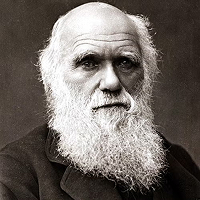Quotes By Charles Darwin

Naturalist And Geologist
Charles Darwin
Feb 12, 1809 - Apr 19, 1882
The most important factor in survival is neither intelligence nor strength but adaptability.
The world will not be inherited by the strongest, it will be inherited by those most able to change.
The love for all living creatures is the most noble attribute of man.
It is not the biggest, the brightest or the best that will survive, but those who adapt the quickest.
A man who dares to waste one hour of time has not discovered the value of life.
Ignorance more frequently begets confidence than does knowledge
In the long history of humankind (and animal kind, too) those who learned to collaborate and improvise most effectively have prevailed.
A mathematician is a blind man in a dark room looking for a black cat which isn't there.
It is not the strongest of the species that survives, nor the most intelligent that survives. It is the one that is the most adaptable to change, that lives within the means available and works cooperatively against common threats.
Nothing exists for itself alone, but only in relation to other forms of life.
Building a better mousetrap merely results in smarter mice.
The impossibility of conceiving that this grand and wondrous universe, with our conscious selves, arose through chance, seems to me the chief argument for the existence of God.
The more one thinks, the more one feels the hopeless immensity of man's ignorance.
The mystery of the beginning of all things is insoluble by us; and I for one must be content to remain an agnostic.
If I had my life to live over again, I would have made a rule to read some poetry and listen to some music at least once a week.
The highest possible stage in moral culture is when we recognise that we ought to control our thoughts.
An American Monkey after getting drunk on Brandy would never touch it again, and thus is much wiser than most men.
Popular Authors










